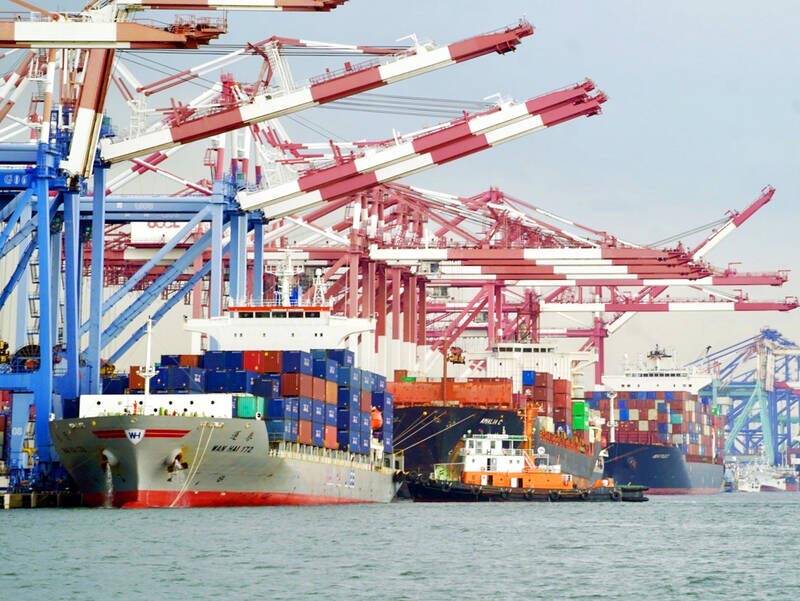China’s Ministry of Commerce yesterday announced that polycarbonate imported from Taiwan would be subject to anti-dumping duties starting today for a period of five years.
In a statement, the ministry confirmed its final determination on anti-dumping measures for imported polycarbonate originating from Taiwan.
Based on its investigation, the ministry concluded that dumping practices were causing harm to China’s polycarbonate industry.

Photo: CNA
According to Taiwan’s Customs Administration data, exports of polycarbonate to China last year amounted to about US$830 million, making it the largest market for Taiwan’s polycarbonate exports, accounting for about 78.5 percent of the total.
Polycarbonate was included as an item in the “early harvest” list of the Economic Cooperation Framework Agreement (ECFA) between Taiwan and China signed in 2010.
Academics have suggested the decision to impose anti-dumping duties on polycarbonate, a material used in various sectors including electronics, automotive, optics, packaging, medical devices and safety equipment, is part of China’s response to broader geopolitical tensions and pressures.
The anti-dumping investigation into imported polycarbonate from Taiwan was initiated by the Chinese Ministry of Commerce in November 2022, with preliminary findings released in August last year confirming dumping practices and substantial harm to China’s polycarbonate industry.
The interim anti-dumping duties imposed on Taiwanese polycarbonate were as high as 22.4 percent.
However, the investigation, originally scheduled to conclude on May 29, saw its final determination announced yesterday ahead of the inauguration of president-elect William Lai (賴清德) on May 20.
The announcement also outlined specific anti-dumping duties for Taiwanese companies, including Taiwan Chemical Fiber Corp (9 percent), Idemitsu Chemicals Taiwan Corp (9 percent), Chimei Corp (12.2 percent), Chi Lin Technology Co, Ltd (12.2 percent) and other Taiwanese entities (22.4 percent).
Taiwan’s Executive Yuan spokesman Lin Tzu-lun (林子論) said yesterday that China’s actions contribute nothing to normalizing cross-strait trade and are unfair toward Taiwanese businesses.
Lin urged China not to politically manipulate trade and to allow cross-strait commerce to return to international norms.
Additional reporting by Chung Li-hua

PREPAREDNESS: Given the difficulty of importing ammunition during wartime, the Ministry of National Defense said it would prioritize ‘coproduction’ partnerships A newly formed unit of the Marine Corps tasked with land-based security operations has recently replaced its aging, domestically produced rifles with more advanced, US-made M4A1 rifles, a source said yesterday. The unnamed source familiar with the matter said the First Security Battalion of the Marine Corps’ Air Defense and Base Guard Group has replaced its older T65K2 rifles, which have been in service since the late 1980s, with the newly received M4A1s. The source did not say exactly when the upgrade took place or how many M4A1s were issued to the battalion. The confirmation came after Chinese-language media reported

The Taiwanese passport ranked 33rd in a global listing of passports by convenience this month, rising three places from last month’s ranking, but matching its position in January last year. The Henley Passport Index, an international ranking of passports by the number of designations its holder can travel to without a visa, showed that the Taiwan passport enables holders to travel to 139 countries and territories without a visa. Singapore’s passport was ranked the most powerful with visa-free access to 192 destinations out of 227, according to the index published on Tuesday by UK-based migration investment consultancy firm Henley and Partners. Japan’s and

A Ministry of Foreign Affairs official yesterday said that a delegation that visited China for an APEC meeting did not receive any kind of treatment that downgraded Taiwan’s sovereignty. Department of International Organizations Director-General Jonathan Sun (孫儉元) said that he and a group of ministry officials visited Shenzhen, China, to attend the APEC Informal Senior Officials’ Meeting last month. The trip went “smoothly and safely” for all Taiwanese delegates, as the Chinese side arranged the trip in accordance with long-standing practices, Sun said at the ministry’s weekly briefing. The Taiwanese group did not encounter any political suppression, he said. Sun made the remarks when

BROAD AGREEMENT: The two are nearing a trade deal to reduce Taiwan’s tariff to 15% and a commitment for TSMC to build five more fabs, a ‘New York Times’ report said Taiwan and the US have reached a broad consensus on a trade deal, the Executive Yuan’s Office of Trade Negotiations said yesterday, after a report said that Washington is set to reduce Taiwan’s tariff rate to 15 percent. The New York Times on Monday reported that the two nations are nearing a trade deal to reduce Taiwan’s tariff rate to 15 percent and commit Taiwan Semiconductor Manufacturing Co (TSMC, 台積電) to building at least five more facilities in the US. “The agreement, which has been under negotiation for months, is being legally scrubbed and could be announced this month,” the paper said,